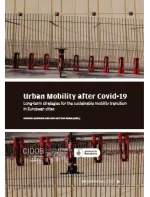The Mobility Factory: A European cooperative providing e-car sharing services to citizens

The climate emergency requires a comprehensive response at all levels. Collectively, public administrations and the different political strata must be pressed to encourage proposals to tackle it. These proposals must be integrated with towns and cities, where we have to rethink certain habits and decisions, such as our consumption model, the energy we use and how we move within the territory. The impact of the latter means it needs particular emphasis: a new mobility model is needed.
The concentration of CO2 in the atmosphere has risen by 47% since 1790.1 The climate consequences of this excessive increase are hard to predict, but their scale will undoubtably depend on when we stop using fossil fuels (IPCC, 2014). With transport currently accounting for around a third of all CO2 emissions, these unpredictable consequences are a key factor in understanding the importance of a new mobility model. The excessive use of internal combustion engine vehicles does not only lead to global warming, it also causes the emission of other polluting particles, such as NO2, PM10 and PM2.5, that cause serious health problems in people, including increased mortality (Landrigan, 2017) and adverse effects on children’s development (Salvi, 2007).